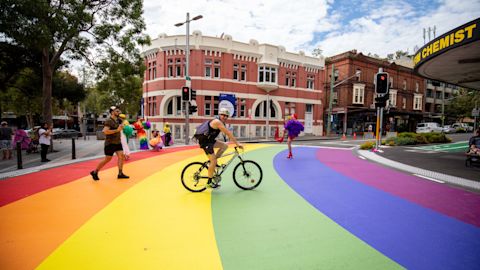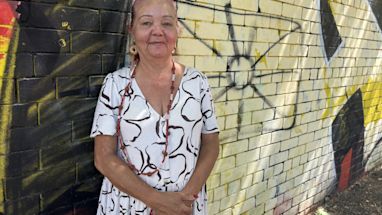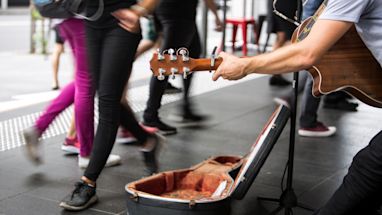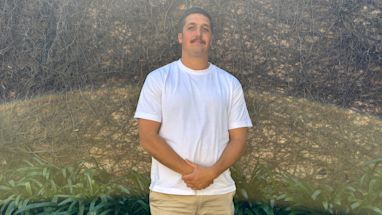The strategy is one of only a handful in the world to explore ways to protect and preserve LGBTIQA+ culture and communities, and the first of its kind in Australia.
Celebrating Oxford Street’s place in the community
Oxford Street has long been recognised as the home of Sydney’s LGBTIQA+ communities.
Over the past 12 months, we consulted widely on ways to revitalise Oxford Street. Overwhelmingly, people called for Oxford Street to remain the focal point for Sydney’s LGBTIQA+ communities and culture.
People asked if more could be done to keep Oxford Street a safe and welcoming hub, and to celebrate the LGBTIQA+ history of the area.
Lord Mayor Clover Moore said Oxford Street’s LGBTIQA+ identity will be prioritised and protected under the new strategy.
“We love Oxford Street. It’s one of our greatest and most-loved streets and we're committed to building on its reputation as an iconic gay and lesbian and creative precinct, buzzing with activity day and night,” Lord Mayor Clover Moore said.
The draft strategy reflects the importance of this precinct and local LGBTIQA+ communities to Australia’s past and future. It aims to promote inclusive businesses, fund new public artworks and support establishing a pride museum around the famed retail and entertainment strip.
It sets out opportunities for the City of Sydney, community organisations and the private sector to strengthen and build upon the street’s LGBTIQA+ character and legacy.
Priorities of the draft strategy
The draft LGBTIQA+ social and cultural place strategy has 5 main priorities and a series of related actions.
1. Recognise historic LGBTIQA+ places and spaces
We’ll review places of significance in the area and update the heritage inventories for important sites to reflect their social and cultural significance to the LGBTIQA+ communities.
We recently acquired the archives of the Sydney Star Observer that includes a vast catalogue of photographs capturing the community over decades.
Through this strategy we want to make these photographs publicly available as a resource for heritage recognition, signs, hoardings artwork and public art.

2. Increase visibility and reflect the LGBTIQA+ communities
To ensure LGBTIQA+ culture and communities are visible and reflected across the precinct, public art, positive messaging, flags, banners and other creative concepts for public spaces will be explored.
We’ll look to add more rainbow crossings in the area, commission local artists to create street murals and explore opportunities for new public art projects that celebrate local LGBTIQA+ icons.

3. Sustain the local character of Oxford Street
Controls and guidelines for businesses will be introduced to ensure Aboriginal and Torres Strait Islander and LGBTIQA+ customers and communities are welcomed and respected in the area.
A range of mandatory and voluntary guidelines will help maintain the local character and identity, create inclusive facilities and help attract more LGBTIQA+ workers and visitors to the area.

4. Increase LGBTIQA+ cultural spaces
We’ll support the opening of a LGBTIQA+ museum and work with advocacy groups, including Qtopia, and the state government to seek funding and find a suitable location.
We’ll bring together landholders, businesses and community groups to explore opportunities for cultural spaces and provide grants to help establish new ventures in the precinct.
5. Ensure the local community is safe and supported
We plan to work with partners to improve access to relevant programs, services and safe spaces for young LGBTIQA+ people, transgender and gender diverse people and older and vulnerable members of the community. We also plan to advocate for diverse housing and accommodation options in the area for young LGBTIQA+ people.
In the lead up to WorldPride 2023, an Oxford Street precinct safety plan will be developed in collaboration with NSW Police and Surry Hills local area command to increase awareness of safety issues for LGBTIQA+ people and improve safety in the area day and night.
Have your say on the draft strategy
We’re now asking people to complete a short survey and provide their feedback. You can also register for an information session on 11 or 16 May.
Consultation closes at 5pm on Tuesday 24 May.
Published 2 May 2022, updated 25 June 2024



